Five MCB postdocs have recently been awarded prestigious fellowships that will support their work in neuroscience and molecular biology.
Jessica Osterhout of the Dulac Lab and Joseph Zak of the Murthy Lab received the NIH Pathway to Independence Award (K99/R00), which will help them continue their work at Harvard and then transition to running their own independent labs. Daniel Friedrich of the D’Souza Lab has been chosen as a DFG (German Research Foundation) Research Fellow, as part of a program that enables early career German scientists to conduct science abroad, and Corey Allard and Patric Vaelli of the Bellono Lab have been awarded Postdoctoral Research Fellowships in Biology (PRFB) through the NSF.
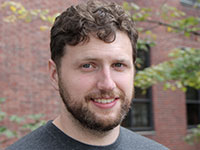
Corey Allard (Bellono Lab)
Receiving an NSF Postdoctoral Research Fellowship (PRFB) will allow Corey Allard to study how a bizarre fish called the sea robin uses its six leg-like sensory appendages to detect prey hidden beneath sand on the sea floor. Allard’s interest in the evolution of unusual animal traits began while performing NSF-funded research as an undergraduate, when he studied extremophilic fish at Palmer Research Station in Antarctica.
“I was part of a team trying to understand how cold-adapted fish species will respond to the rapidly changing water temperatures brought by climate change,” he says. “I’m still focused on understanding the complex interactions between organisms and their environment, so I’m very honored to have continued support from the NSF as a Postdoctoral Research Fellow in Biology.”
Allard discovered his current model organism, the sea robin, during grad school when he took a class at Marine Biological Laboratory in Wood’s Hole. “Biologists have been interested in the sensory abilities of sea robins since the 1800s, but there are virtually no modern molecular studies focusing on this question,” he says.
“It’s challenging to come to a new institution where you don’t know anyone and try to piece together a team of collaborators and mentors, which is really essential when applying for fellowships or just doing research day to day,” he adds. “The MCB community has been extremely supportive, and I feel thankful that so many members of the community were willing to extend a huge amount of guidance and support to a newcomer.”
He says, “I’m currently hiding from coronavirus in my Beacon Hill apartment, reading papers, analyzing data, working on grants, and anxiously planning experiments for our eventual return to lab and some resemblance of a normal life in science.”
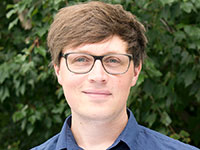
Daniel Friedrich (D’Souza Lab)
The DFG Research Fellowship supports early career German scientists like Daniel Friedrich of the D’Souza Lab to pursue research overseas.
“I am very happy and thankful for receiving the DFG Research Fellowship!” Friedrich says. “It helps me a lot to gain independence as I started to establish my own line of research in collaboration with multiple labs – the D’Souza group at MCB, and the Arthanari and Wagner labs at Dana-Farber Cancer Institute and Harvard Medical School.”
Friedrich seeks to understand how Intrinsically Disordered Regions (IDRs) in proteins recognize RNA strands. “Such binding events play important roles in essential cellular processes, for example in protein synthesis,” he explains. “I want to understand the fundamentals of these interactions biophysically and biochemically at atomic level, involving complex nuclear magnetic resonance (NMR) approaches that I can realize here at Harvard.”
“I want to thank my mentors and collaborators who made this Fellowship possible. I also want to encourage everyone to apply for their own funding, there’s many possibilities!” he says.
The COVID-19 crisis is a challenging time for scientists, but Friedrich has been able to make some progress on data analysis from home. “I enjoy regular lab meetings, discussions and talks over Zoom, but I am very much looking forward to the day when we finally can do experiments again!” he says.
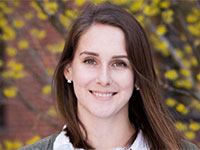
Jessica Osterhout (Dulac Lab)
Jessica Osterhout of the Dulac Lab has been chosen as a recipient of the highly competitive NIH Pathway to Independence Award (K99/R00), which will provide two more years of funding for her postdoc and up to three years of funding when she launches her own independent lab. “I was very excited to receive this fellowship,” Osterhout says.
She is currently investigating how the nervous system creates the feeling of being sick. “The fellowship will enable me to study how the brain induces sickness symptoms during an infection,” she explains. “It will specifically allow me to do more cutting edge techniques like single cell sequencing, which will show us the kinds of brain cells that are important for sickness.”
The state of sickness often manifests through both physiological changes, such as fevers, and behavioral changes, such as moving around less. Osterhout became particularly interested in the behavior of sickness when she learned that some autistic people express milder autism symptoms when they’re feverish. “When I dug further into the topic I learned that we have no clue how brain activity or brain circuits are changed during sickness,” she says. That absence of data was motivating for Osterhout. She hopes her upcoming experiments will help pinpoint which neurons contribute to these behavioral changes.
She adds, “Thank you to my PI Catherine Dulac for her mentorship during my postdoc and support for my future scientific career.”
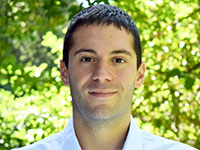
Patric Vaelli (Bellono Lab)
Patric Vaelli found out that he had been chosen as an NSF Postdoctoral Research Fellow via an unexpected personal phone call from a Program Officer at the NSF. “It comes as especially welcomed news during these uncertain times in isolation and away from our normal lives in the lab,” Vaelli says. “Given the overall goals of the NSF, to support basic science research and scientific training across diverse disciplines, I feel particularly humbled to have been selected.”
Vaelli’s fellowship is under the auspices of a new competitive area within the Division of Biological Infrastructure (DBI): “Integrative Research Investigating the Rules of Life Governing Interactions Between Genomes, Environment and Phenotypes.” It will provide up to two years of funding for his research on sensory systems in marine molluscs, such as cephalopods and sea slugs.
“To me, sensory biology is so interesting because these are the core molecular processes that generate our perception and experience of the world around us,” Vaelli says. “By investigating sensory physiology across diverse organisms, we can better understand the core fundamental principles by which molecular processes convert environmental stimuli into cellular signals that can be understood by the nervous system.”
He is especially interested in investigating how symbiotic interactions between species play into sensory processes.
“I want to thank my postdoc advisor Nick Bellono for all of his support in my research endeavors and for his critical feedback in writing my proposal(s),” Vaelli adds. “Nick is an incredibly talented scientist who always has the big picture in his view. He has incredible clarity, and his guidance has already had an amazing impact on my own approach to science.”
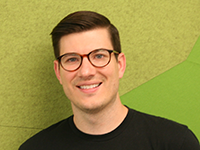
Joseph Zak (Murthy Lab)
Being selected to receive an NIH Pathway to Independence Award (K99/R00) will enable Joseph Zak to continue studying how learning changes sensory perception in the Murthy Lab and the Uchida Lab for the next two years and will also provide three years of funding for when he starts his own independent laboratory.
“I have always been fascinated with the way that past experiences can uniquely shape our future interactions with the world,” Zak says. “For example, how does the brain reorganize its activity and connectivity to allow for important stimuli to be detected against complex backgrounds of distractors. One example might be, how does the brain learn to identify the scent of your favorite fruit contained within the homogeneous smell of a fruit salad? Or know that your favorite fruit is missing?”
Zak studies olfaction in mice by teaching them to identify specific scents from complex mixtures of odors. “The olfactory system is an ideal model for studying how animals integrate information about external cues,” he says. “In this project, I focus on the characterization of a neural circuit that could underlie learning-mediated plasticity in the olfactory bulb to enhance olfactory scene segmentation—a mechanism underlying your ability to detect your favorite fruit within a blend.”
At present, Zak is holed up in Michigan, where he has been analyzing data, writing papers, and teaching Neuro101F online.
“I am deeply thankful for the support of my mentors at Harvard and letter writers for their enthusiasm for the project and their confidence in my ability to transition to an independent faculty member,” he says. “I am also grateful to be part of the fantastically supportive MCB community.”


